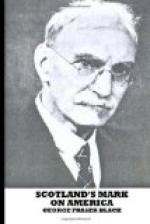Brooklyn Navy Yard and there built six ships of the
line. In 1822 he built the steamer “Robert
Fulton,” which made the first successful steam
voyage to New Orleans and Havana. Angus Neilson
Macpherson (1812-76), born at Cluny, Inverness-shire,
was builder of the frigate “Ironsides,”
and designer of the furnaces for heating large plates
and the method of affixing them to the sides of the
vessel. Donald Mackay (1810-80), born in Nova
Scotia, grandson of Donald Mackay of Tain, Ross-shire,
established the shipyards at East Boston, and constructed
a number of fast sailing ships, and during the Civil
War a number of warships for the United States Government.
The beauty and speed of his clippers gave him a world
wide reputation as a naval constructor. Thomas
Dickson (1822-84), President of the Delaware and Hudson
Canal Co., was born in Lauder. William Grey Warden
(1831-95), born in Pittsburgh of Scottish ancestry,
was a pioneer in the refining of petroleum in Pennsylvania,
and the controlling spirit in the work of creating
the great Atlantic Refinery consolidated with the Standard
Oil Company of Ohio in 1874. George Gibson McMurtry
(1838-1915), born in Belfast of Scottish descent,
steel manufacturer and philanthropist, was “one
of the big figures of that small group of men which
established the industrial independence of the United
States from the European nations of cheap labor.”
James Edwin Lindsay (1826-1919), lumberman, was descended
from Donald Lindsay, who settled in Argyle, New York,
in 1739. John McKesson (b. 1807), descended from
the McKessons of Argyllshire, was founder of the,
wholesale drug firm of McKesson and Robbins; and Alfred
B. Scott of the wholesale drug firm of Scott and Bowne
was also of Scottish descent. Edmond Urquhart
(b. 1834) was one of the pioneers in the creation
of the cotton seed oil industry. To Andrew Carnegie
(1835-1919), born in Dunfermline, “the richest
and most free-handed Scot who ever lived,” more
than anyone else is due the great steel and iron industry
of the United States. His innumerable gifts for
public libraries, etc., are too well known to
need detailing here. To New York alone he gave
over five million dollars to establish circulating
branches in connection with the New York Public Library.
In the development of the steel business of Pittsburgh
he was ably seconded by James Scott, George Lauder
(his cousin), Robert Pitcairn, Charles Lockhart, and
others—all Scots. James McClurg Guffey
(b. 1839), oil producer and capitalist, was of Galloway
descent. He developed the oil fields of Kansas,
Texas, California, West Virginia, and Indian Territory.
The town of Guffey, Colorado, is named in his honor.
His brother Wesley S. Guffey was also prominent in
the oil industry. John Arbuckle (1839-1912), merchant
and philanthropist, known in the trade as the “Coffee
King,” was born in Scotland. Robert Dunlap
(b. 1834), hat manufacturer and founder of Dunlap
Cable News Company (1891), was of Ulster Scot origin.




